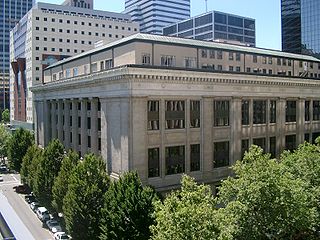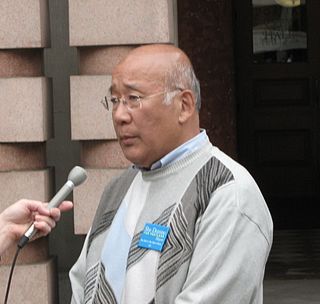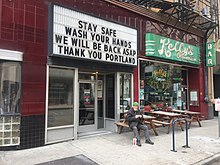
Multnomah County is one of 36 counties in the U.S. state of Oregon. As of the 2010 United States Census, the county's population was 735,334. Its county seat, Portland, is the state's largest city. Multnomah County is part of the Portland-Vancouver-Hillsboro, OR-WA Metropolitan Statistical Area, and though smallest in area, it is the state's most populous county.

The Oregon Bottle Bill is a container-deposit legislation enacted in the U.S. state of Oregon in 1971 and went into effect in October 1972 and it was the first such legislation in the United States. It has been amended in 2007 and 2011. It requires applicable beverages in applicable sizes in glass, plastic or metal cans or bottles sold in Oregon to be returnable with a minimum refund value. The refund value was initially 5 cents until April 1, 2017 when it increased to 10 cents. The Oregon legislature has given the Oregon Liquor Control Commission the authority to administer and enforce the Bottle Bill. A private cooperative of deposit initiating distributors called the Oregon Beverage Recycling Cooperative (OBRC) administers the collection and transportation of containers with deposit. Deposit that has been paid, but not redeemed by consumers are kept by the OBRC to fund their operations. The OBRC sells the commodity from collected containers and disburses the proceeds to cooperative members. This is not part of the BottleDrop operating budget.

The Sellwood Bridge is a deck arch bridge that spans the Willamette River in Portland, Oregon, in the United States. The current bridge opened in 2016 and replaced a 1925 span that had carried the same name. The original bridge was Portland's first fixed-span bridge and, being the only river crossing for miles in each direction, the busiest two-lane bridge in Oregon. The Sellwood Bridge links the Sellwood and Westmoreland neighborhoods of Portland on the east side with Oregon Route 43/Macadam Avenue on the west side. At its east end it leads to Tacoma Street. The bridge is owned and operated by Multnomah County. The original span of 1925 was a steel truss bridge, while its 2016 replacement is a deck-arch-type bridge.
Interstate 405 is a short Interstate Highway in Portland, Oregon. It forms a loop that travels around Downtown Portland west of the Willamette River, between two junctions with I-5 at the Marquam Bridge and Fremont Bridge.

Oregon Health & Science University (OHSU) is a public university in Oregon with a main campus, including two hospitals, in Portland, Oregon. The institution was founded in 1887 as the University of Oregon Medical Department and later became the University of Oregon Medical School. In 1974, the campus became an independent, self-governed institution called the University of Oregon Health Sciences Center, combining state dentistry, medicine, nursing, and public health programs into a single center. It was renamed Oregon Health Sciences University in 1981 and took its current name in 2001, as part of a merger with the Oregon Graduate Institute (OGI), in Hillsboro. The university has several partnership programs including a joint PharmD Pharmacy program with Oregon State University in Corvallis.

Portland Mercury is an alternative bi-weekly newspaper and media company founded in 2000 in Portland, Oregon. Its revenue model is strongly connected on advertisement and sales of tickets for events and concerts. Nearly 95% of its revenue comes from advertisement.

The Oregon Convention Center is a convention center in Portland, Oregon. Completed in 1989, and opened in 1990, it is located on the east side of the Willamette River in the Lloyd District neighborhood. It is best known for the twin spire towers, which provide light into the building's interior and for housing the world's largest Foucault Pendulum. The center is owned by Metro, the Portland area's regional government, and operated by the Metropolitan Exposition and Recreation Commission.

Sho Dozono is a Japanese-American businessman and politician from Portland, Oregon. He was a nominee in the 2008 Portland mayoral race. Portland City Commissioner Sam Adams was the front runner throughout the race. Dozono, who would have faced Adams again in November if neither candidate had cleared 50%, lost to him in the primary when Adams won 58% of the vote.

Edward Tevis Wheeler is an American politician who has served as the mayor of Portland, Oregon, since 2017. He previously served as Oregon State Treasurer.

RingSide Steakhouse is a restaurant located in Portland, Oregon.

Kyron Richard Horman is an American boy who disappeared from Skyline Elementary School in Portland, Oregon, on June 4, 2010, after allegedly attending a science fair. Local and state police, along with the FBI, conducted an exhaustive search for Horman and launched a criminal investigation, but have not uncovered any significant information regarding the child's whereabouts. His disappearance sparked the largest criminal investigation in Oregon history. As of 2020, his whereabouts remain unknown.

The 2016 Portland mayoral election was held on Tuesday, May 17, 2016 to elect the 53rd mayor of Portland, Oregon. Incumbent mayor Charlie Hales did not seek a second term, and the primary race was won by Ted Wheeler, who garnered greater than 54% of the vote. Jules Bailey was the runner-up to Wheeler, only receiving 16% of the vote.

The Women's March on Portland, also known as the Portland Women's March, the Women's March on Washington, Portland, and Women's March Portland, was an event in Portland, Oregon. Scheduled to coincide with the 2017 Women's March, it was held on January 21, 2017, the day after the inauguration of Donald Trump. The march was one of the largest public protests in Oregon's history with crowd estimates as high as 100,000 participants. No arrests were made during the demonstration.

A large gas explosion occurred in the Northwest District neighborhood of Portland, Oregon at NW 23rd Avenue and NW Glisan Street on October 19, 2016. Nearby excavation caused a natural gas leak that triggered the explosion, which injured eight people and caused property damages totaling $17.2 million. The Oregon Public Utilities Commission determined the cause to be inadequate notification by the contractor, Loy Clark Pipeline. In total, 13 buildings were damaged, including the total destruction of the Alfred C. F. Burkhardt House, built in 1906 and listed on the National Register of Historic Places.

March for Our Lives Portland was a protest held in Portland, Oregon, as part of March for Our Lives, a series of rallies and marches in Washington, D.C., and more than 800 cities across the world on March 24, 2018. Students organized the event, which included a march from the North Park Blocks to Pioneer Courthouse Square where a rally featured speakers, a performance by rock band Portugal. The Man, and a surprise appearance by rapper Black Thought of hip-hop band The Roots. The protest was the city's largest since the January 2017 Women's March on Portland; the Portland Police Bureau estimated a crowd size of 12,000.
The 2019–20 international cricket season was from September 2019 to April 2020. 29 Test matches, 78 One Day Internationals (ODIs) and 145 Twenty20 Internationals (T20Is), as well as 23 Women's One Day Internationals (WODIs) and 61 Women's Twenty20 Internationals (WT20Is), were scheduled to be played during this period. Additionally, a number of other T20I/WT20I matches were scheduled to be played in minor series involving associate nations. The season started with India leading the Test cricket rankings, England leading the ODI rankings and Pakistan leading the Twenty20 rankings. In the women's rankings, Australia women lead both the WODI and WT20I tables. The 2020 ICC Women's T20 World Cup in Australia took place during this time, starting on 21 February 2020, with hosts Australia winning the tournament for the fifth time.

Mother's Bistro and Bar is a restaurant in Portland, Oregon.

The 2019–2020 coronavirus pandemic was confirmed to have reached the U.S. state of Oregon on February 28, 2020.

The 2019–20 coronavirus pandemic was confirmed to have reached the U.S. state of Wyoming in March 2020. On April 13, Wyoming became the last state in the U.S. to report its first death from COVID-19. On April 14, Wyoming reported its 2nd COVID-19 related death.

The 2019–20 coronavirus pandemic has impacted religion in various ways, including the cancellation of the worship services of various faiths, the closure of Sunday Schools, as well as the cancellation of pilgrimages surrounding observances and festivals. Many churches, synagogues, mosques, and temples have offered worship through livestream amidst the pandemic. Relief wings of religious organisations have dispatched disinfection supplies, powered air-purifying respirators, face shields, gloves, coronavirus nucleic acid detection reagents, ventilators, patient monitors, syringe pumps, infusion pumps, and food to affected areas. Other churches have offered free COVID-19 testing to the public. Adherents of many religions have gathered together to pray for an end to the COVID-19 pandemic, for those affected by it, as well as for wisdom for physicians and scientists to combat the disease.

































